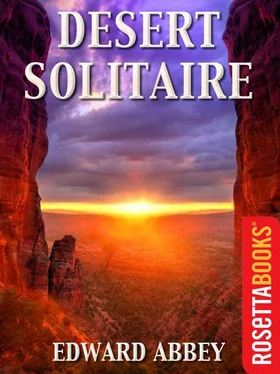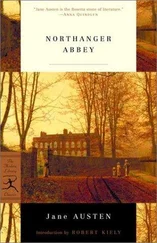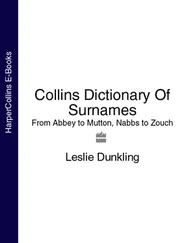Abbey, Edward - Desert Solitaire (Edward Abbey Series )
Здесь есть возможность читать онлайн «Abbey, Edward - Desert Solitaire (Edward Abbey Series )» — ознакомительный отрывок электронной книги совершенно бесплатно, а после прочтения отрывка купить полную версию. В некоторых случаях можно слушать аудио, скачать через торрент в формате fb2 и присутствует краткое содержание. Год выпуска: 2011, Издательство: RosettaBooks, Жанр: Старинная литература, на английском языке. Описание произведения, (предисловие) а так же отзывы посетителей доступны на портале библиотеки ЛибКат.
- Название:Desert Solitaire (Edward Abbey Series )
- Автор:
- Издательство:RosettaBooks
- Жанр:
- Год:2011
- ISBN:нет данных
- Рейтинг книги:4 / 5. Голосов: 1
-
Избранное:Добавить в избранное
- Отзывы:
-
Ваша оценка:
- 80
- 1
- 2
- 3
- 4
- 5
Desert Solitaire (Edward Abbey Series ): краткое содержание, описание и аннотация
Предлагаем к чтению аннотацию, описание, краткое содержание или предисловие (зависит от того, что написал сам автор книги «Desert Solitaire (Edward Abbey Series )»). Если вы не нашли необходимую информацию о книге — напишите в комментариях, мы постараемся отыскать её.
Desert Solitaire (Edward Abbey Series ) — читать онлайн ознакомительный отрывок
Ниже представлен текст книги, разбитый по страницам. Система сохранения места последней прочитанной страницы, позволяет с удобством читать онлайн бесплатно книгу «Desert Solitaire (Edward Abbey Series )», без необходимости каждый раз заново искать на чём Вы остановились. Поставьте закладку, и сможете в любой момент перейти на страницу, на которой закончили чтение.
Интервал:
Закладка:
THE SERPENTS OF PARADISE
The April mornings are bright, clear and calm. Not until the afternoon does the wind begin to blow, raising dust and sand in funnel-shaped twisters that spin across the desert briefly, like dancers, and then collapse—whirlwinds from which issue no voice or word except the forlorn moan of the elements under stress. After the reconnoitering dust-devils comes the real the serious wind, the voice of the desert rising to a demented howl and blotting out sky and sun behind yellow clouds of dust, sand, confusion, embattled birds, last year’s scrub-oak leaves, pollen, the husks of locusts, bark of juniper.…
Time of the red eye, the sore and bloody nostril, the sand-pitted windshield, if one is foolish enough to drive his car into such a storm. Time to sit indoors and continue that letter which is never finished—while the fine dust forms neat little windrows under the edge of the door and on the windowsills. Yet the springtime winds are as much a part of the canyon country as the silence and the glamorous distances; you learn, after a number of years, to love them also.
The mornings therefore, as I started to say and meant to say, are all the sweeter in the knowledge of what the afternoon is likely to bring. Before beginning the morning chores I like to sit on the sill of my doorway, bare feet planted on the bare ground and a mug of hot coffee in hand, facing the sunrise. The air is gelid, not far above freezing, but the butane heater inside the trailer keeps my back warm, the rising sun warms the front, and the coffee warms the interior.
Perhaps this is the loveliest hour of the day, though it’s hard to choose. Much depends on the season. In midsummer the sweetest hour begins at sundown, after the awful heat of the afternoon. But now, in April, we’ll take the opposite, that hour beginning with the sunrise. The birds, returning from wherever they go in winter, seem inclined to agree. The pinyon jays are whirling in garrulous, gregarious flocks from one stunted tree to the next and back again, erratic exuberant games without any apparent practical function. A few big ravens hang around and croak harsh clanking statements of smug satisfaction from the rimrock, lifting their greasy wings now and then to probe for lice. I can hear but seldom see the canyon wrens singing their distinctive song from somewhere up on the cliffs: a flutelike descent—never ascent—of the whole-tone scale. Staking out new nesting claims, I understand. Also invisible but invariably present at some indefinable distance are the mourning doves whose plaintive call suggests irresistibly a kind of seeking-out, the attempt by separated souls to restore a lost communion:
Hello … they seem to cry, who… are… you?
And the reply from a different quarter. Hello … (pause) where… are… you?
No doubt this line of analogy must be rejected. It’s foolish and unfair to impute to the doves, with serious concerns of their own, an interest in questions more appropriate to their human kin. Yet their song, if not a mating call or a warning, must be what it sounds like, a brooding meditation on space, on solitude. The game.
Other birds, silent, which I have not yet learned to identify, are also lurking in the vicinity, watching me. What the ornithologist terms l.g.b.’s—little gray birds—they flit about from point to point on noiseless wings, their origins obscure.
As mentioned before, I share the housetrailer with a number of mice. I don’t know how many but apparently only a few, perhaps a single family. They don’t disturb me and are welcome to my crumbs and leavings. Where they came from, how they got into the trailer, how they survived before my arrival (for the trailer had been locked up for six months), these are puzzling matters I am not prepared to resolve. My only reservation concerning the mice is that they do attract rattlesnakes.
I’m sitting on my doorstep early one morning, facing the sun as usual, drinking coffee, when I happen to look down and see almost between my bare feet, only a couple of inches to the rear of my heels, the very thing I had in mind. No mistaking that wedgelike head, that tip of horny segmented tail peeping out of the coils. He’s under the doorstep and in the shade where the ground and air remain very cold. In his sluggish condition he’s not likely to strike unless I rouse him by some careless move of my own.
There’s a revolver inside the trailer, a huge British Webley .45, loaded, but it’s out of reach. Even if I had it in my hands I’d hesitate to blast a fellow creature at such close range, shooting between my own legs at a living target flat on solid rock thirty inches away. It would be like murder; and where would I set my coffee? My cherrywood walking stick leans against the trailerhouse wall only a few feet away but I’m afraid that in leaning over for it I might stir up the rattler or spill some hot coffee on his scales.
Other considerations come to mind. Arches National Monument is meant to be among other things a sanctuary for wildlife—for all forms of wildlife. It is my duty as a park ranger to protect, preserve and defend all living things within the park boundaries, making no exceptions. Even if this were not the case I have personal convictions to uphold. Ideals, you might say. I prefer not to kill animals. I’m a humanist; I’d rather kill a man than a snake.
What to do. I drink some more coffee and study the dormant reptile at my heels. It is not after all the mighty diamondback, Crotalus atrox , I’m confronted with but a smaller species known locally as the horny rattler or more precisely as the Faded Midget. An insulting name for a rattlesnake, which may explain the Faded Midget’s alleged bad temper. But the name is apt: he is small and dusty-looking, with a little knob above each eye—the horns. His bite though temporarily disabling would not likely kill a full-grown man in normal health. Even so I don’t really want him around. Am I to be compelled to put on boots or shoes every time I wish to step outside? The scorpions, tarantulas, centipedes, and black widows are nuisance enough.
I finish my coffee, lean back and swing my feet up and inside the doorway of the trailer. At once there is a buzzing sound from below and the rattler lifts his head from his coils, eyes brightening, and extends his narrow black tongue to test the air.
After thawing out my boots over the gas flame I pull them on and come back to the doorway. My visitor is still waiting beneath the doorstep, basking in the sun, fully alert. The trailerhouse has two doors. I leave by the other and get a long-handled spade out of the bed of the government pickup. With this tool I scoop the snake into the open. He strikes; I can hear the click of the fangs against steel, see the stain of venom. He wants to stand and fight, but I am patient; I insist on herding him well away from the trailer. On guard, head aloft—that evil slit-eyed weaving head shaped like the ace of spades—tail whirring, the rattler slithers sideways, retreating slowly before me until he reaches the shelter of a sandstone slab. He backs under it.
You better stay there, cousin, I warn him; if I catch you around the trailer again I’ll chop your head off.
A week later he comes back. If not him, his twin brother. I spot him one morning under the trailer near the kitchen drain, waiting for a mouse. I have to keep my promise.
This won’t do. If there are midget rattlers in the area there may be diamondbacks too—five, six or seven feet long, thick as a man’s wrist, dangerous. I don’t want them camping under my home. It looks as though I’ll have to trap the mice.
However, before being forced to take that step I am lucky enough to capture a gopher snake. Burning garbage one morning at the park dump, I see a long slender yellow-brown snake emerge from a mound of old tin cans and plastic picnic plates and take off down the sandy bed of a gulch. There is a burlap sack in the cab of the truck which I carry when plucking Kleenex flowers from the brush and cactus along the road; I grab that and my stick, run after the snake and corner it beneath the exposed roots of a bush. Making sure it’s a gopher snake and not something less useful, I open the neck of the sack and with a great deal of coaxing and prodding get the snake into it. The gopher snake, Drymarchon corais couperi , or bull snake, has a reputation as the enemy of rattlesnakes, destroying or driving them away whenever encountered.
Читать дальшеИнтервал:
Закладка:
Похожие книги на «Desert Solitaire (Edward Abbey Series )»
Представляем Вашему вниманию похожие книги на «Desert Solitaire (Edward Abbey Series )» списком для выбора. Мы отобрали схожую по названию и смыслу литературу в надежде предоставить читателям больше вариантов отыскать новые, интересные, ещё непрочитанные произведения.
Обсуждение, отзывы о книге «Desert Solitaire (Edward Abbey Series )» и просто собственные мнения читателей. Оставьте ваши комментарии, напишите, что Вы думаете о произведении, его смысле или главных героях. Укажите что конкретно понравилось, а что нет, и почему Вы так считаете.












